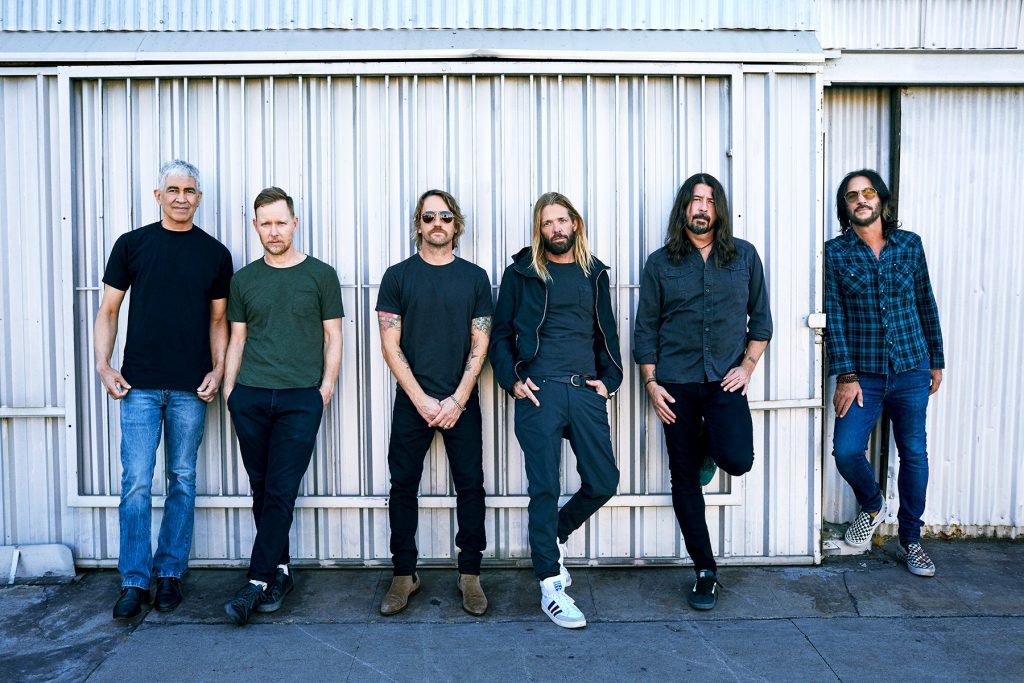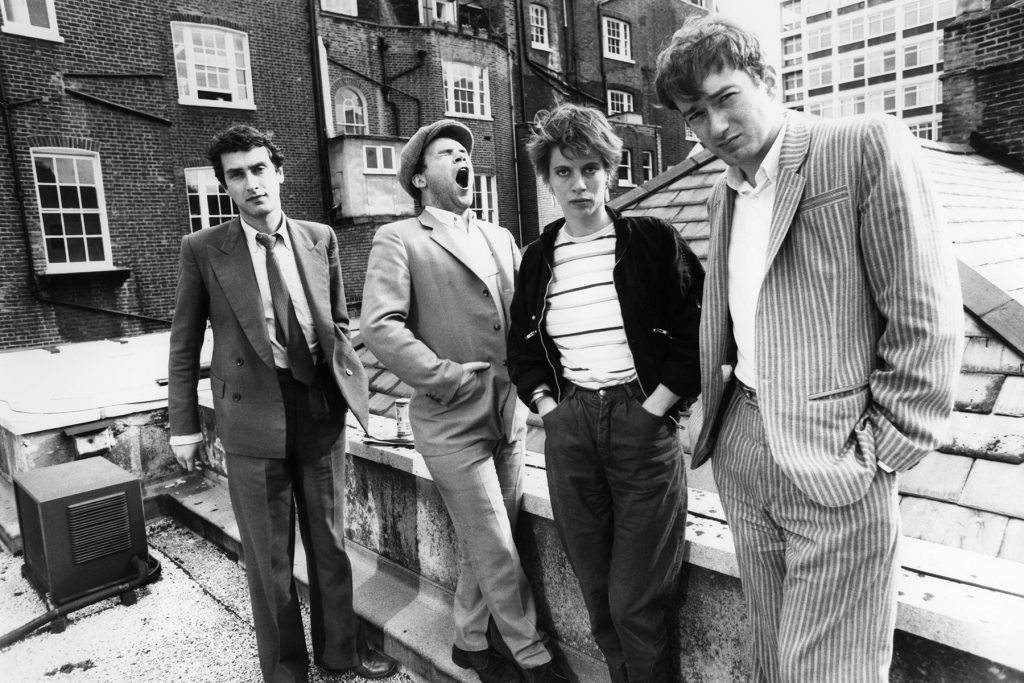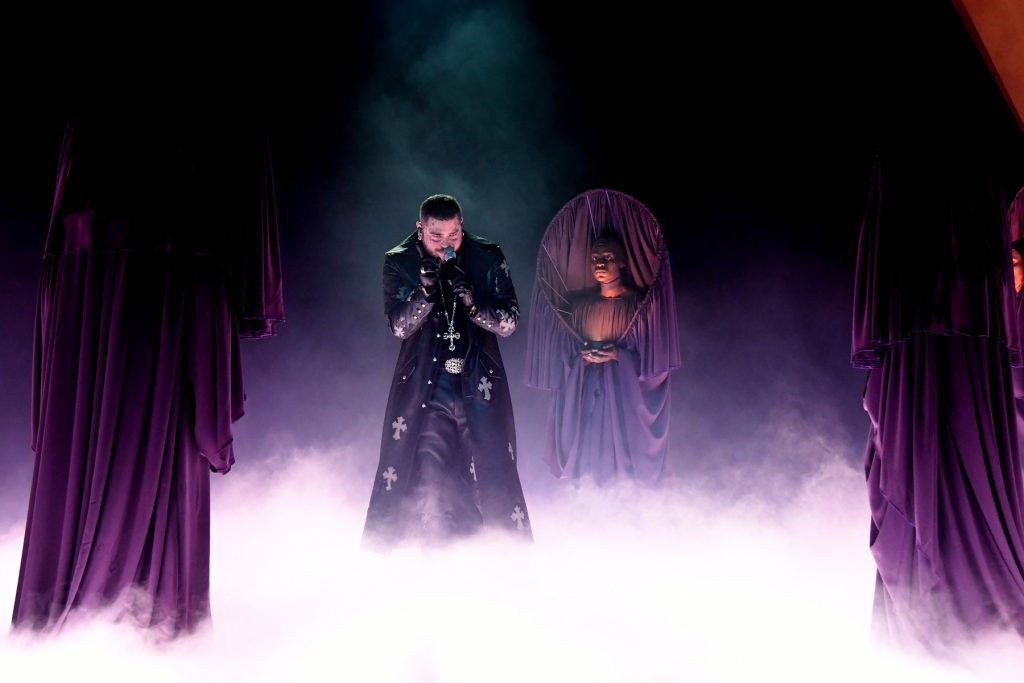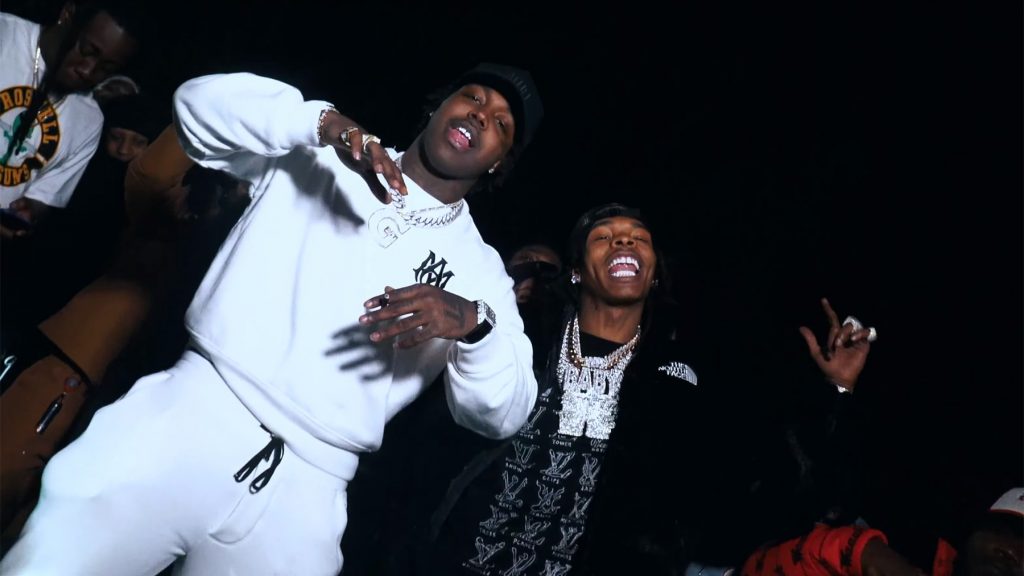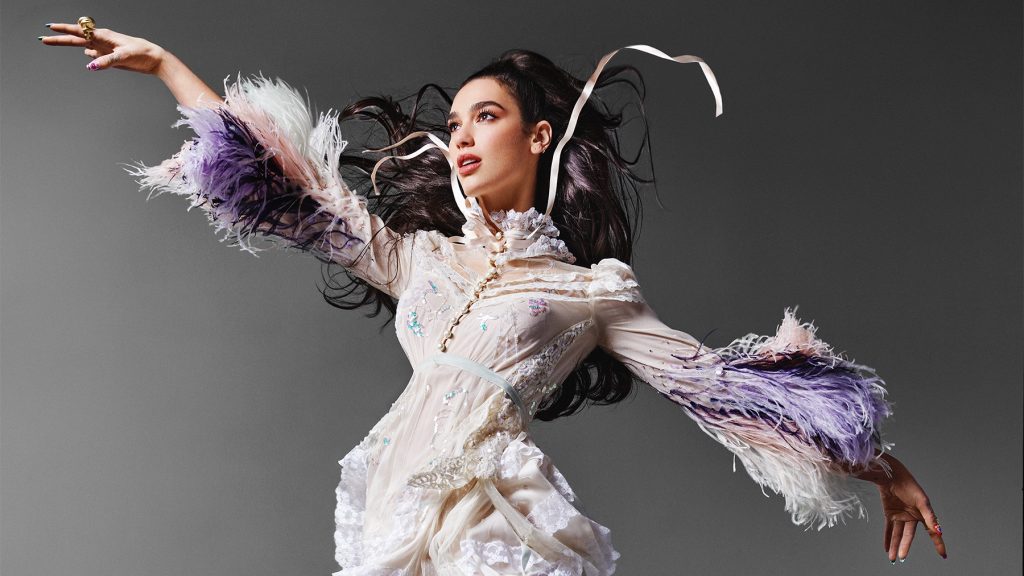
Dancing in the Dark
Dancing in the Dark
How Dua Lipa ignored the trends, turned herself into a “female alpha,” and delivered the modern disco classic we didn’t know we needed
We’re standing next to a 15-ton meteorite when it occurs to Dua Lipa that, for maybe one of the first times in many months, her life is back to an approximation of what it might be in that very moment if the coronavirus pandemic had never happened. That is not to say that her day — which has involved waking up on luxuriant sheets in Manhattan’s Bowery Hotel, wearing a black silk bralette as a bona fide shirt, eating a dessert that looks like a gilded egg atop a nest in a private dining room on the 101st floor of Hudson Yards, doing an interview for the Grammys, and wandering after hours in the American Museum of Natural History, a locale chosen for its tenuous connection to the disco-space vibe of her second album, Future Nostalgia — is normal, per se. But up until about a week ago, she should have been on an eight-month tour to promote Future Nostalgia, which she most certainly was not.
Now, it’s mid-December, a week when the tour would have been over, when life would have gone back to some sort of pop-star version of “normal,” doing the kind of things she’s done today, even if she’s currently doing them behind a black mask and in between a continuous series of Covid-19 tests. “I get tested all the time,” she’d told me earlier from across a wide table, removing the mask to tuck into that gilded egg.
blogherads.adq.push(function () {
blogherads
.defineSlot( ‘medrec’, ‘gpt-mob-article-inbody1-uid0’ )
.setTargeting( ‘pos’, [“mid-article”,”mid”,”in-article1″,”mid-article1″] )
.setSubAdUnitPath(“music//article//inbody1”)
.addSize([[300,250],[2,2],[3,3],[300,461],[320,480],[2,4],[4,2]])
;
});
It was certainly not a year to cry for the suffering of pop stars (see: luxurious sheets, gilded desserts, after-hours VIP tours). But for Lipa — the breakout pop star of the pandemic era — the past nine months have been a study in how to not lose momentum when the world is pressing pause. Last winter, she returned home from Australia to find her London flat flooded and that plumbers, like the rest of the city, were in lockdown. She was thus living in an Airbnb with both a mini fridge (“I was like, ‘This isn’t going to work for a pandemic’ ”) and boyfriend Anwar Hadid (regular model and brother to supermodels Gigi and Bella) when news hit in late March that Future Nostalgia had leaked. As artists like Lady Gaga and Sam Smith were deciding to delay their album releases, Lipa’s hands were tied: She took to Instagram Live to tearfully announce the album would be coming out early, right into the throes of a burgeoning global health crisis. She worried it would get lost in the much bigger story that was unfolding and/or that it might feel unseemly in the moment, a feel-good collection of uptempo bangers released amid a deadly crisis. “I was terrified,” she says now, circling the meteorite. “But at the same time, I was like, ‘For some people, this is a form of escapism?’ ”
blogherads.adq.push(function () {
blogherads
.defineSlot( ‘medrec’, ‘gpt-mob-article-inbody2-uid1’ )
.setTargeting( ‘pos’, [“mid-article2″,”mid”,”in-article2″,”mid-article”] )
.setSubAdUnitPath(“music//article//inbody2”)
.addSize([[300,250],[300,251],[2,4],[4,2],[320,480],[3,3]])
;
});
It certainly was. As Lipa found herself promoting a new album from the sofa of her Airbnb, Future Nostalgia became the soundtrack to sock-footed solo dance parties the world over (or to twerking in your dining room, as she later put it on Jimmy Kimmel Live). Maybe none of us knew that this was the music we wanted to hear right then, but Lipa showed us that it was. “It was a little bit of a sucker punch,” says collaborator Mark Ronson. “I don’t think anybody was expecting Dua to deliver the great cohesive pop record of 2020, but there was a sonic cohesion in the way that Random Access Memories or The Suburbs or a Frank Ocean record feel cohesive — records that were made to sit together so people will buy it and digest it like that. And it hit right at the moment of lockdown.”
The week of the album’s debut, Lipa was the most listened-to female artist on Spotify — and the third most streamed artist on the planet. Lyrics like “Don’t show up/Don’t come out” and “I should have stayed at home” became quarantine memes. She was nominated for six Grammys, including Album of the Year, Song of the Year, and Best Pop Solo Performance. As Miley Cyrus put it, specifically about Future Nostalgia but also inadvertently summing up the collective conscious of 2020: “I need a fucking dance party!”
Suddenly, stuck at “home” making banana jerky with Hadid, months away from seeing a glam team or an SNL appearance, or even her own furniture, Lipa found herself becoming one of the most powerful women in the pop industry. “It’s so crazy,” she says now, talking about the actual meteorite, but also inadvertently summing up her own meteoric rise. “I mean, I didn’t think it would look like that.” The question was, what on earth to do about it?

Dua Lipa photographed in Los Angeles on December 21st, 2020.
Photograph by David LaChapelle. Produced by Coleen Haynes at Maavven. Executive production by Creative Exchange Agency. Hair by Chris Appleton. Makeup by Samantha Lau. Styling by Lorenzo Posocco. Bodysuit, gloves, and tights by Rui Zhou.
It’s safe to say that even in a world without Covid-19, the success of Future Nostalgia was not a foregone conclusion. But it’s also safe to say that Lipa is not one to leave things to chance. Certainly not when, as a teenager, she started recording herself singing covers in her friend’s boyfriend’s bedroom “studio.” Certainly not when she took that “portfolio,” as she puts it, to London clubs like KOKO, where she felt she’d inevitably encounter music-industry folks she could play said covers for. Certainly not when she got herself scouted at Topshop, signing with a modeling agency though she had no desire to actually be a model. “That was another thing where I was like, ‘OK, this is something that maybe could help me get out there.’ ” And it did: Her agency hooked her up with a job singing for an X Factor ad, where she was introduced to a producer who had worked with Ed Sheeran and One Direction. That led to an offer of a publishing deal (“I was excited by it, but had no idea what it meant”) and eventually to her manager, Ben Mawson, who got her signed with Warner.
blogherads.adq.push(function () {
blogherads
.defineSlot( ‘medrec’, ‘gpt-mob-article-inbodyX-uid2’ )
.setTargeting( ‘pos’, [“mid”,”mid-articleX”,”in-articleX”,”mid-article”] )
.setSubAdUnitPath(“music//article//inbodyX”)
.addSize([[300,250],[300,251],[3,3]])
.setLazyLoadMultiplier(2)
;
});
Thus began several years of putting out singles, seeing what would stick. She quit her job at a restaurant called La Bodega Negra, but did so politely, assuming she might need to eventually go back: “In my head, I was like, ‘Who knows?’ I felt like I had so much proving to do.” She distinguished herself with her work ethic. “I’ve seen her get off a plane and hit a double session,” says producer Stephen “Koz” Kozmeniuk. “That’s not normal. And getting thrown in a room with a million other people with three hours to write a song? It’s super intimidating. But she was just relentless.”
Lipa says that her 2017 debut was an exercise in finding her sound. “It was such an amalgamation of different genres that I’m passionate about, and discovering myself and my songwriting,” she tells me. The album showcased the loveliness of Lipa’s smoky voice and earned her a Grammy, but despite its obvious pleasures, it lacked an identity that could be singled out as Lipa’s own. And her live performances didn’t necessarily help her forge one, either. A YouTube comment on her appearance at the 2018 BRIT Awards — “I love her lack of energy. Go girl give us nothing” — became a full-on Twitter meme.
Still, the single “New Rules” became the moment’s ubiquitous breakup anthem, enumerating all the things one was not to do with someone who’d recently broken one’s heart (because, of course, “If you’re under him, you ain’t getting over him”). The song went multiplatinum, buoyed by the success of its video, in which a gaggle of stoic young women remind one another of the breakup rules as they stalk the halls of the hotel hosting their slumber party and brush one another’s luxuriant hair.
It presented a view of female solidarity that emerged as a theme for Lipa, showing up in videos for “IDGAF” (populated by a diverse army of women in power suits) and “Blow Your Mind (Mwah)” (in which the fierce female ensemble projects tenderness toward one another and, at one point, hoists aloft signs reading “Dua for President” and “You Can Sit With Us”). More than just offering #SquadGoals, the videos offered a vision of a feminism so ingrained as to be implicit. Three months after the “New Rules” video came out, the Harvey Weinstein scandal broke and the #MeToo movement exploded. Suddenly, young women brushing one another’s hair like that could be seen, at least within the parameters of pop, as performing a sort of political act — and it appeared that Lipa had already intuited this.
blogherads.adq.push(function () {
blogherads
.defineSlot( ‘medrec’, ‘gpt-mob-article-inbodyX-uid3’ )
.setTargeting( ‘pos’, [“mid”,”mid-articleX”,”in-articleX”,”mid-article”] )
.setSubAdUnitPath(“music//article//inbodyX”)
.addSize([[300,250],[300,251],[3,3]])
.setLazyLoadMultiplier(2)
;
});
“It was this unconscious decision,” she says of the solidarity theme. “It was just very much like, ‘This is just what it is — me and the girls — and this is how we talk with our friends.’ ”
But Lipa kept talking, frequently pointing out the inconsistencies in how men and women are treated in the music industry. She called out Recording Academy President Neil Portnow’s 2018 comment that female performers needed to “step up” by casually announcing in her 2019 Grammy acceptance speech for Best New Artist, “I guess this year we really stepped up.” When she was chastised for attending Lizzo’s 2020 Grammy afterparty at the Crazy Girls strip club in Los Angeles, she defended not just herself but women in general. “I just feel like, if you’re a feminist, you have to also support women in all fields of work,” she says. “We have to support sex workers, we have to believe that that [work] is their choice and their right. It seems quite hypocritical, I think, people picking and choosing as to how they want to support women and when it suits them. That’s another form of misogyny, which really derives from the male gaze.”
In fact, when in thrall to the natural beauty on display at the museum, I casually mention Lipa’s own beauty, that the way she looks “maybe had a certain power,” she goes quiet for a moment and then gives me a generic answer about feeling better when she’s taking good care of herself. She’s far too poised to be truly prickly, but still, I can tell that I’ve stepped in it. I gingerly steer the conversation back on track.

Dua Lipa photographed in Los Angeles on December 21st, 2020.
Photograph by David LaChapelle. Top by Paco Rabanne
Most pop stars try to curate the way gazes come their way. Even offstage, they seem to want to be viewed as extraordinary beings, to be gawked at and adored. Lipa apparently does not. In the pop landscape, and especially in person, she comes across as extraordinarily down-to-earth. “She obviously looks like an iconic pop star, but there’s nothing precious about it,” says Ronson, who should know a thing or two about precious pop stars. “There’s a lack of pretension or anything like that.” Over lunch, Lipa had been warm and gracious not just to me but to everyone we encountered, from the waitstaff (“Peppermint tea, please”; “That’s lovely”; “Thank you so much”) to the nervous young pastry chef who whisked her (masked) into the kitchen to demonstrate the complex construction of her gilded egg (“So pretty”; “I love it!”). She’d asked about my kids and our experience of the pandemic (not remotely a given in these type of encounters) and responded thoughtfully to what I said, all while giving off an air of calm, like some wise, old soul stuck improbably in a 25-year-old’s body. “I don’t have two personas, an alter ego for who goes onstage,” she told me. “I’ve never had that issue, figuring out, ‘I’m going to be this character today, or this is who I’m going to play, or this is the role I want to take on.’ It’s hard for me to make stories up.”
blogherads.adq.push(function () {
blogherads
.defineSlot( ‘medrec’, ‘gpt-mob-article-inbodyX-uid4’ )
.setTargeting( ‘pos’, [“mid”,”mid-articleX”,”in-articleX”,”mid-article”] )
.setSubAdUnitPath(“music//article//inbodyX”)
.addSize([[300,250],[300,251],[3,3]])
.setLazyLoadMultiplier(2)
;
});
And why should she? When I’d asked whether the fondling of Miley Cyrus on the “Prisoner” video was a case of really good acting or some sort of messaging about her sexuality, she simply shrugged and said, “It was a very real moment.” She’d also talked casually about her relationship with Hadid (“I’m very comfortable in the relationship, more so than any others”) and the time she’d spent on his family farm in Pennsylvania this year: “Wake up around 9:00, 9:30, shower, get dressed, have a bit of breakfast, take the dog out on a really nice long walk, maybe do some yoga, make some lunch, hang out, watch a movie, play with the animals,” which include cows, goats, and the horses that she’s learning to ride (“I can do it gently; I’m not good”). Last Christmas, she gifted Hadid two pygmy goats, Funky and Bam-Bam, which she says make excellent pets. “You can take them inside,” she marvels. “They love a cuddle.”
For a pop star who is so perfectly palatable, cuddly farm animals and all, Lipa has also proved extraordinarily forthcoming about her political beliefs. She’s vocally pro-Palestine. She’s supported the Labour Party in her native U.K. and Bernie Sanders here in the States, even setting up an interview with him before the last election (“I thought it was a long shot — I mean, he’s busy — but he was amazing”). “Online people are like, ‘Just shut up and sing. What do you know? Why do you care so much?’ ” she says. “But I think people forget how small our world is. And it’s getting smaller all the time.”
She should know. Her family is Kosovar Albanian, refugees of the conflicts in the Balkans, and both of her grandfathers were historians. “My grandfather on my dad’s side was writing books about everything that was happening,” she explains. “When the occupation happened, Serbian forces wanted him to rewrite history. He refused, and he lost his job. So it’s part of who I am to stand by the things I believe in.”
As the wars heightened, Lipa’s parents left university (in addition to fronting a rock band called Oda, her dad was studying dentistry; her mom was studying law) to move to London, folding themselves into a community of Kosovo refugees who had coalesced in Camden to escape the regional violence of their home. Like so many immigrants, they forfeited the white-collar professional lives they would have had to work in bars and restaurants, often holding down multiple jobs and attending school at night. Lipa, whose first name means “love” in Albanian, was born three years after their move. At age nine, she started spending her Saturdays at the Sylvia Young Theatre School, which Rita Ora, Tom Fletcher, and Amy Winehouse had once attended. A few lessons in, a voice teacher asked her to stand up and sing. Afterward, he bumped Lipa up to a more advanced class, one that was full of teenagers. “I was terrified,” she says, “but he was the first person to tell me I could sing.”
blogherads.adq.push(function () {
blogherads
.defineSlot( ‘medrec’, ‘gpt-mob-article-inbodyX-uid5’ )
.setTargeting( ‘pos’, [“mid”,”mid-articleX”,”in-articleX”,”mid-article”] )
.setSubAdUnitPath(“music//article//inbodyX”)
.addSize([[300,250],[300,251],[3,3]])
.setLazyLoadMultiplier(2)
;
});
Lipa grew up knowing that while London was her birthplace, it wasn’t really her home. “With the refugee situation, people don’t understand that people wouldn’t leave their country unless there was a need for it,” she explains. “The plan was always to go back to Kosovo.” When she was 11, her family did, and she expected to finally fit in in a way she felt she hadn’t in London. “And then I got there,” she says, “and I was the Albanian girl speaking Albanian in an English accent.” Eventually, she made friends and those friends introduced her to hip-hop (her first album was Nelly Furtado’s Whoa, Nelly! — “And it just became my life” — though her first concert was Method Man and Redman). But she longed to return to London, to the music classes and the greater opportunities she sensed were there.

Dua Lipa photographed in Los Angeles on December 21st, 2020.
Photograph by David LaChapelle. Dress by Marc Jacobs. Rings by Vram.
At 15, she persuaded her parents to let her move in with the daughter of a family friend in Camden. That she spent the rest of her teenage years basically unsupervised, making herself pasta and receiving orders to clean her room from several countries away, is a testament to the type of teenager she was: a late bloomer, a listmaker (“Do homework, have a shower, do my poetry — I would have a time scheduled for everything”), a driven kid whose one and only brush with the law involved throwing bath bubbles off a balcony and onto passersby just as a cop happened to be walking past, and who secured an “A” in math as part of a deal with her mom to get her bellybutton pierced. She was not part of the popular group at school, the girls she refers to as “not posh, but very English, a bit thoroughbred.” Her best friends were, and still are, two girls who approached her one day while she was having lunch. “They were the first to be like, ‘We know you’re new, so we just wanted to come say hi and hang out.’ I never let them go.”
Female solidarity came naturally to Lipa, but empowerment took some time. Her impulse with her music was to write about her deepest emotions, but it was hard to enter a studio and lay her vulnerabilities bare for a producer she’d met only moments before. She learned to turn the emotion on its head, to imagine that she’d come out on the other side. “My music, a lot of it is what I hope. I hope to empower women,” she explains. Take the motivational mantra that opens Future Nostalgia: “You want a timeless song, I wanna change the game . . . I know you ain’t used to a female alpha.” “Those [words] don’t immediately come from something that I believe,” she continues. “It’s more that I start off with a false sense of confidence, and then the more I sing it, the more I perform it, the more I put it out into the world, the more I feel like I live it, breathe it, embody those lyrics and those words.”
blogherads.adq.push(function () {
blogherads
.defineSlot( ‘medrec’, ‘gpt-mob-article-inbodyX-uid6’ )
.setTargeting( ‘pos’, [“mid”,”mid-articleX”,”in-articleX”,”mid-article”] )
.setSubAdUnitPath(“music//article//inbodyX”)
.addSize([[300,250],[300,251],[3,3]])
.setLazyLoadMultiplier(2)
;
});
With her first album, she had ample opportunity to practice that embodiment: She performed 245 times for her first tour, a number she proudly has tattooed on the back of her left arm. By the time she met up with Ronson in 2018 to cut “Electricity” (which went on to win a Grammy for Best Dance Recording), “ ‘New Rules’ was playing in every bodega that I ever went to,” he tells me. “And she just had such a great no-nonsense, boss vibe. There’s something about Dua that’s extremely powerful. You feel like she’s just kind of living her life and putting it out there for you. She’s just a boss.”
Some time in early 2018, somewhere in Las Vegas, Lipa was on a stroll when, in a “lightbulb moment,” the title of her second album came to her. “I just had that feeling of wanting it to be very reminiscent and nostalgic,” she says. “Something that touches on inspiration and the music that I listened to my whole life” — Blondie, Prince, Moloko, Eighties Madonna — “but also very current.” She texted her manager the idea, she says, “and he was like, ‘OK, I love the name,’ and I was like, ‘Just let me go with it. Let me get in the studio and see what kind of comes.’ ”
Which is what she did, teaming up with old collaborators like Koz, Sarah Hudson, and Clarence Coffee Jr. They worked in London at Abbey Road Studios. They went to Jamaica’s Geejam Studios in January. “And it pisses down rain the whole two weeks,” Lipa says with a laugh. “But it worked in our favor, got me ready to write again, to know what I wanted to write about and where I wanted to go.”

Dua Lipa photographed in Los Angeles on December 21st, 2020.
Photograph by David LaChapelle. Earrings and ring by Jennifer Fisher.
In sessions, Lipa gravitated toward tracks made with analog synths rather than computers, ones that had imperfections and intentionality, that seemed bespoke rather than easily replicated. To Koz, it “felt like an old-school project,” like the way music used to be made before it became a matter of “basically making little music loops, using the same sample libraries, a little guitar, drums, chop it up into a trap” — a sort of paint-by-numbers system that he credits with being “the reason everything sounds the same.” He continues, “When you get someone like Dua who wants to reject that system and do something more ambitious, it’s quite refreshing.”
blogherads.adq.push(function () {
blogherads
.defineSlot( ‘medrec’, ‘gpt-mob-article-inbodyX-uid7’ )
.setTargeting( ‘pos’, [“mid”,”mid-articleX”,”in-articleX”,”mid-article”] )
.setSubAdUnitPath(“music//article//inbodyX”)
.addSize([[300,250],[300,251],[3,3]])
.setLazyLoadMultiplier(2)
;
});
Sessions would often start with Hudson reading tarot cards — “It gets you talking,” she tells me — and with Lipa laying out the bits of lyrics or themes she had accumulated since they last met. She talked about driving a car in space — an image that eventually lent itself to the album cover — and also “being with Austin Powers, that kind of Sixties, space-themed vibe.” Lipa laughs: “I say lots of random, stupid shit in sessions. But we all wanted to talk about this, like, intergalactic feeling of love.”
It helped that Lipa was in a different place writing this album. “When I was creating the first album, a lot of what was going on in my life was about heartbreak,” she explains. “This time around, I was feeling so happy and things were going so well, I was like, ‘OK, I need to be able to portray this feeling in a way that doesn’t feel cheesy to me.’ I don’t know why I thought that when you’re a pop artist and you make a happy song, then all of a sudden it’s just not cool. I kind of just had to let that go.” She didn’t give ballads much thought. “There was a point where I was like, ‘Oh, everybody loves a ballad. Maybe I should make one.’ But that wasn’t what I was feeling. I was like, ‘Fuck it. It’s a fun record. That’s what it is.’ ”
The challenge, at least initially, was getting others to understand what it was, or what it should be. “We had been trying ideas and nothing was really clicking,” says Hudson. Then one day in August 2018, in the Sarm Studios in Notting Hill, “Dua was like, ‘I’m ordering doughnuts.’ And we were like, ‘Oh, my God, no, please. I don’t want to eat doughnuts.’ And we eat them all and get this insane sort of sugar rush and were bouncing off the wall, and that’s when ‘Levitating’ started to come out.” Koz played the track, Lipa started making up the melody, and they wrote the song pretty much all in one VoiceNote, including the word “sugarboo” — possibly the most inspired single word in any lyric of the past year — in homage to the nickname they have for each other.
The track nailed what Lipa was trying to accomplish. A few months later, after attending a disco night at a dive bar in Jackson Hole, Wyoming, songwriters Emily Warren, Ian Kirkpatrick, and Caroline Ailin — the trio behind “New Rules” — penned “Don’t Start Now,” which would become Future Nostalgia’s lead single. The album would go on to reference INXS’ “Need You Tonight” and White Town’s “Your Woman.” There would be shades of Olivia Newton-John and Eurythmics, mixed with more modern bass lines and Lipa’s strong, confident vocals. It would indeed sound like nothing 2020 had yet to offer. “It went against the grain of everything else,” says Koz. “It felt like music had just been so dark for so long. I mean, you walked into rooms and everybody just wanted to make, like, trap beats. And then here comes Dua, and she’s like, ‘Fuck that. A song should make you dance.’ ”
blogherads.adq.push(function () {
blogherads
.defineSlot( ‘medrec’, ‘gpt-mob-article-inbodyX-uid8’ )
.setTargeting( ‘pos’, [“mid”,”mid-articleX”,”in-articleX”,”mid-article”] )
.setSubAdUnitPath(“music//article//inbodyX”)
.addSize([[300,250],[300,251],[3,3]])
.setLazyLoadMultiplier(2)
;
});
It’s possible that Lipa could have rested on her laurels, could have stayed on the farm cuddling the pygmy goats, and that Future Nostalgia would still have made people dance all over the planet. But that wasn’t her vision. Within days of the album’s release, and broadcasting from the rental with the mini fridge, she performed amid a grid of dancers and musicians for James Corden (with whom she later recorded a socially distanced “New Rules for Covid Dating”). A week later, she was remote-appearing on Jimmy Fallon (with whom she later recorded a socially distant Love Actually parody). Club Future Nostalgia, a remix of the entire album, came out in August, unapologetically offering fans a club record for a year with no clubbing. And after giving up hope that 2020 would allow for a tour, she spent a large chunk of the fall in a bubble with backup dancers and other musicians so that they could create Studio 2054, a live virtual show that channeled the Eighties’ televised musical extravaganza Solid Gold, and that was, metaphorically, solid gold: When it went live in late November, more than 5 million people tuned in, setting a paid-live-stream record. Around minute 62, Lipa brought back a dance move for which she was once ridiculed. This time she owned it.

Dua Lipa photographed in Los Angeles on December 21st, 2020.
Photograph by David LaChapelle. Bodysuit and shoes by Mugler. Earrings by Bulgari.
The last time I talk to Lipa — over Zoom, the week after our meeting in Manhattan — it’s the day after her extremely belated Saturday Night Live appearance, the first time she’d performed for a live audience since her album’s release. It was the last SNL episode of 2020.
And while 2020 may have been Lipa’s year, it was certainly a cruel one — so cruel that maybe it wasn’t just her music that appealed, but also the gratification of seeing a very talented but very grounded woman unapologetically grab her own success when so much felt out of control otherwise. That’s the sense I get, at least, when Lipa now reminds me of the question I’d asked before, the one about the power of her beauty.
“I’ve been thinking about it almost every day, and I was just a little bit taken aback,” she says, politely but firmly. “I’ve never really seen being pretty or beautiful as some kind of power. It’s never been something that I identify with and — with no disrespect to you, obviously — I feel like I was a little bit shortchanged in a way, because I don’t feel like I’ve gotten to where I am because of that. I’m extremely hardworking and driven, and I feel like that’s the reason why I got to where I am, through my hard work and my drive, and I just wanted to make that clear because it has been playing on my mind.”
blogherads.adq.push(function () {
blogherads
.defineSlot( ‘medrec’, ‘gpt-mob-article-inbodyX-uid9’ )
.setTargeting( ‘pos’, [“mid”,”mid-articleX”,”in-articleX”,”mid-article”] )
.setSubAdUnitPath(“music//article//inbodyX”)
.addSize([[300,250],[300,251],[3,3]])
.setLazyLoadMultiplier(2)
;
});
In the blip of silence that follows, my feminism tries to brush itself off. I’m tempted to point out that more than one thing can be true, that an effect can have many causes, and that I had merely wanted to gauge her own self-perception about a particular, non-exhaustive trait. But then I think of all those shows, all those times singing all those lyrics she’d written to convince herself of her own strength. I think of her in all those sessions, trying to go against the grain — and of what her sense of self means for her ability to do so. Sometimes, I reason, empowerment is a matter of will. Sometimes the feminism must be explicit.
So I apologize, and I do so sincerely. And of course, she is gracious and unprickly as always.
Just before we sign off for the last time, I ask what hardly needs asking: if the process of willing herself into empowerment is complete. “Do you feel like you’re a female alpha now? Have you internalized that?”
“I’ve internalized that, yes,” she says without hesitation. “I feel good.”
